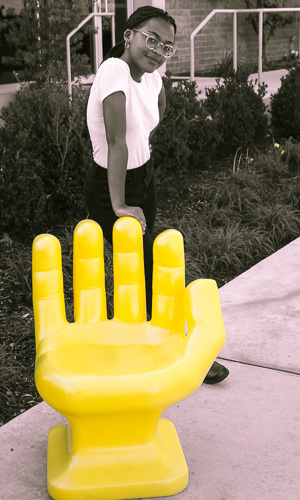Celeste just wants to be called a writer, plain and simple. It’s reductionist to call her a journalist, or an editor, or a screenwriter. She’s all of those things, yes, but she’s always had a knack for wordsmithing.
Celeste’s role as a writer has shifted over time. “My roots as a writer have been in short stories,” she says. When she came to Biola she took that love for narrative and used it in her screenwriting classes. Lately, she’s been moving into journalism and editorial work.
Refining natural talent is a challenge, but writing in different mediums has given Celeste unique insight into the process. Through hard work and risk taking, she’s turned her affinity for writing into a powerful skill.
The Humility to Learn
“Just because you have natural talent doesn’t mean you can’t still learn.”
That’s the major lesson Celeste took away from her first screenwriting class, one of the hardest she’s taken in the film program. On the first day, her professor expected they dress professionally and bring in three pitches for scripts, along with a short presentation.
Celeste felt in over her head. Up until this class, she had never written a screenplay, now she was expected to pitch an idea for three of them.
Over the course of the semester, she wrote half of a screenplay. That’s about sixty pages of content, not including drafts, revisions, and the hours spent coming up with characters and storylines. The next class she took she wrote a full one.
“I came into college thinking ‘I’m so talented, I’ve been writing since I was in elementary school,’” she says. Screenwriting was a wake up call. Going from not knowing anything to writing a screenplay was a humbling and confidence building process.
Celeste chose to use her natural talent constructively, not as an excuse to take it easy or pretend she was above it all. She put in the work it took to learn and proved her talent could produce something tangible - an entire movie script.

Take Risks
Celeste loves to try new things. In the few years she’s been at Biola she’s started a podcast, collaborated on film projects with professors, and most recently, stepped into the world of journalism.
Unlike starting a podcast or collaborations, which sort of fell into her lap, this didn’t. It took courage to pursue opportunities for journalism.
She’s currently working on the editorial board for Grit, a new women’s resource blog at Biola. She’s helping to write for the blog, manage social media and seek out resources for women on campus. It’s a whole new direction for her, but she loves it.
“I got to work and I don’t want to leave,” she says.
Celeste also wrote an article for Shotgun, a student-produced magazine. In it she talks about the intersection of race and gender. It’s an important and vulnerable topic to tackle, especially for someone who writes about fictional characters rather than herself.
“It’s a different kind of format where I’m sharing more,” she says.
Sharing a piece of oneself is always an emotional risk, and perhaps this is the hardest thing about Celeste’s journalistic aspirations. Her opinions, thoughts, and feelings are all out on the table via her writing. Challenges are essential in order to refine natural talent, and sometimes you just have to take the risk when there isn’t a professor or mentor around to force you.
Share Your Work
Celeste says she’s always been shy about sharing her talents.
“I used to make YouTube videos in high school… I was making these for years and I hadn’t told the world about them,” she says. “I have a problem with not wanting to share the things that I’m doing”
Creating and executing projects is a cakewalk, but in retrospect she regrets not sharing more. She looks back and sees a lot of missed opportunities.
Still, Celeste remembers a big opportunity that came about because she was able to share her talents with someone else. As a Resident Advisor (RA) she had frequent one-on-ones with her Resident Director (RD). These were times for Celeste to talk about her skills and passions.
Later, her RD was talking with Associate Dean of Spiritual Development Lisa Igram about an upcoming women's resource blog. She recommended Celeste to Lisa and she was hired to work on what would soon be known as Grit.
“She got me the job for the women’s resource blog, basically,” she says.
Celeste tends to think that her projects are not a big deal, or that sharing them will bother other people. This is not the case. Everyone has natural talents, but if others don’t get a chance to see them, there will be less opportunities for growth and development.
Know Your Limits
Celeste had the opportunity to write a screenplay with her screenwriting professor and a fellow student. They wrote a feature film together over last summer. It was meant to be a Biola film.
“It was hard for me a little bit, since I love doing my own thing,” she says.
It was good for her. She was able to apply what she had learned in screenwriting classes, and experience what a writer’s room was like. Ultimately though, she realized that type of collaboration wasn’t totally for her.
“Ok, I wanna do my own thing… that’s just me being 100 percent honest,” she says.
Celeste found she wasn’t very good at sharing the task of writing with others, though she has worked well with others on projects like Grit.
It’s important to know your limits. You may work well in one context, then do something very similar in another context but feel drained and uninspired. Having natural talent does not mean you will be good at everything your discipline touches.
As with any talent, it takes lots and lots of practice to hone your skills. Celeste has courageously expedited this process by humbling, challenging, and sharing herself. Many people are hesitant to refine their skills, but it’s only natural that talent should be tested.
Want more inspiring stories? Subscribe to our newsletter to get fresh stories every 2 weeks.
 Biola University
Biola University


.jpg)
.jpg)